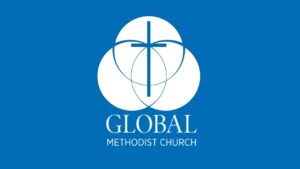We are Trinity Methodist Church
About
The Living Mission: Following Christ' Mission
“To make disciples of Jesus Christ who worship passionately, love extravagantly, and witness boldly” is exactly what Jesus called all followers to do. God’s vision for Trinity Methodist Church and how we will accomplish our Mission is purposefully
The Vision
Love (both God & people; Matthew 22:37-38 & 39-40)
Grow (intentionally; Ephesians 3:17; 2 Peter 1:2)
Serve (just like Jesus did; Matthew 20:26b-28)
A Legacy of Faith and Community
Our Enduring Heritage
For 150 years, we’ve been a beacon of Christ’s love. We’ve faced trials and triumphs, always serving faithfully. Our history is rich, built on the dedication of those before us. In the 1960s, three congregations united as Trinity United Methodist Church. This unity shaped our journey of worship and service.
Embracing a Global Connection
In June 2023, we disaffiliated from the United Methodist Church. We joined the Global Methodist Church. This decision reflects our commitment to God’s will. We’re excited for this new chapter of service.
The Birth of Methodism
The Methodist movement began in the 1720s at Oxford University when John and Charles Wesley and their friends sought to deepen their Christian faith through daily spiritual disciplines. Their “methodical” approach to faith, which included holding each other accountable, earned them the label “Methodists.” Despite the initial ridicule, the group embraced the name and continued their fellowship, laying the foundation for the Methodist movement that would grow to millions worldwide.
Episcopal Beliefs
Scripture
Tradition
Reason
The Baptismal Convenant
To stay up to date on what’s going on, and get inspirational messages, make sure you follow us on social media.
Part Four of the Book of Doctrines and Discipline, “The Community of God’s People,” outlines the mission, principles, and structure of the Global Methodist Church.
Section I: Foundational Principles The mission of the Global Methodist Church is to make disciples of Jesus Christ and spread “scriptural holiness” globally. The church aims to do this by “worshipping passionately, loving extravagantly, and witnessing boldly”. It views itself as a worldwide body, recognizing the gifts and leadership of all its members across different continents and cultures. The church is founded on the principle of a shared covenant, where members are meant to grow in discipleship together, holding one another accountable in love. The ministry of the laity is emphasized, with all Christians called through baptism to serve and use their gifts for God’s work, in full partnership with the clergy. This includes sharing the gospel, ministering to others, and working to renew the world. The church’s approach to discipleship is defined as an intentional process grounded in Wesleyan heritage, aiming to develop individuals whose lives reflect Christ’s character and mission. The church is committed to inclusiveness, which means being open to all persons without discrimination based on race, color, national origin, disability, or gender, and ensuring all can participate fully in its spiritual life and leadership. The document also provides a legal definition of the church, stating that the “Global Methodist Church” as a whole is not a legal entity, but its individual units, such as conferences and local churches, are.
Section II: The Church and Pastoral Charge The local church is considered the primary setting for disciple-making and is a “strategic base” for Christians to engage with society. Its purpose is to help people accept Christ, grow in their relationship with God, and live justly and lovingly. A pastoral charge is defined as one or more churches organized under the church’s discipline, with an appointed pastor. In cases where an ordained or licensed minister cannot be appointed, a qualified layperson may be assigned to lead the ministry, with sacramental authority provided by an ordained minister.
Section III: Church Membership Membership in a local Global Methodist church is open to all who have been baptized and have professed their faith. This includes baptized members, who have received Christian baptism, and professing members, who have also made a public profession of faith and taken membership vows. All members of a local congregation are considered members of the Global Methodist Church and the universal church. The document defines a sacrament as an “outward and visible sign of an inward and spiritual grace” and names Holy Baptism and Holy Communion as the two sacraments ordained by Christ. Holy Baptism unites a person with Christ, while Holy Communion is a sign of God’s grace and a means of fellowship with Christ and the church. Both sacraments are to be administered by elders, though bishops may extend sacramental authority to deacons in certain ministry settings.
Section VII: Organization and Administration Each local church is to be organized to carry out its mission effectively within its community. A congregation must have a charge conference and a church council or similar governing board. The church council is responsible for planning, implementing, and evaluating the church’s mission and ministry, and its members must be of “genuine Christian character”. All official meetings of the church’s administrative bodies are open to all professing members, with exceptions for discussions on personnel or legal matters. The charge conference is the foundational unit connecting the local church to the wider denomination. It meets at least annually to review the church’s mission, elect leaders, and adopt goals.
Section VIII: Local Church Administrative Committees The local church may have a Nominations and Leadership Development Committee, a Pastor-Parish Relations Committee (or Staff-Parish Relations Committee), a Board of Trustees, and a Finance Committee. The Nominations Committee is responsible for identifying, developing, and deploying spiritual leaders for the congregation. The Pastor-Parish Relations Committee encourages, strengthens, and supports the pastor and staff, and is responsible for their annual evaluation and for communicating the needs of the congregation to them. The Board of Trustees oversees and cares for all of the local church’s property. The Finance Committee oversees the church’s financial resources, prepares the budget, and is responsible for an annual audit of the church’s financial statements.

Book of Discipline
Revision Date of January 15, 2025
To read more, please refer to the Book of Discipline



